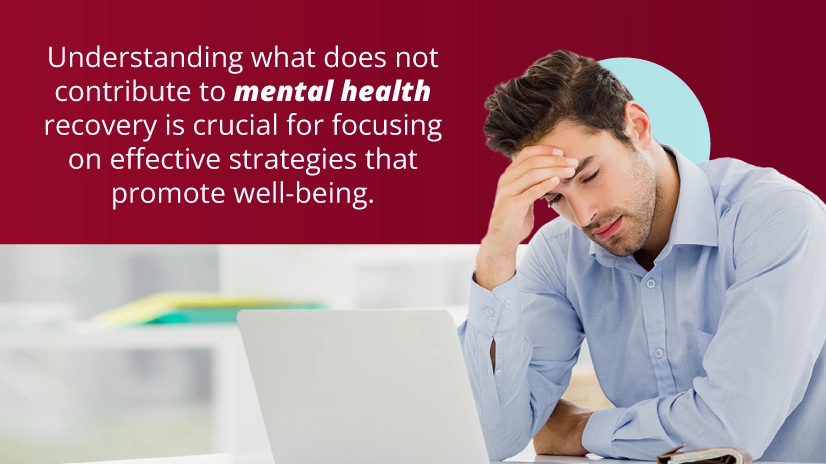
Common Missteps in Mental Health Recovery
Understanding the factors that contribute to mental health recovery is vital for individuals navigating their journey toward well-being. While some aspects, like therapy, medication, and support networks, play crucial roles, it’s equally important to recognize what does not define this process.
Identifying these aspects can provide clarity and realistic expectations for those seeking recovery. In this blog, we explore what does not constitute a key factor of mental health recovery, shedding light on misconceptions and highlighting the true pillars that support lasting well-being.
Key Takeaways
Mental health recovery involves personalized journeys toward well-being after experiencing serious mental illness. Here is what this article covers:
- Recovery isn’t about quick fixes or one-size-fits-all solutions but rather a gradual process involving patience and multifaceted support.
- Effective mental health recovery involves recognizing myths that can misguide efforts toward achieving stability and resilience.
- The stigma surrounding mental health can perpetuate misconceptions, leading to fear, discrimination, and barriers to seeking help.
Indiana Center for Recovery offers compassionate mental health services tailored to your individual needs—contact us today at (844) 650-0064.

Understanding Mental Health Recovery
Mental health recovery involves the journey towards well-being and stability after experiencing mental illnesses. It’s a process where individuals strive to manage symptoms, enhance quality of life, and achieve personal goals. Recovery isn’t just about symptom relief but also about rebuilding a meaningful life despite challenges.
Many factors contribute to mental health recovery, such as support from loved ones, access to quality healthcare, and self-care practices. However, it’s equally important to recognize what may not contribute significantly to recovery. Misconceptions, like simply “thinking positive” or ignoring symptoms, can hinder recovery progress.
Understanding what doesn’t contribute to mental health recovery can be as essential as knowing what does. This knowledge helps individuals focus on evidence-based approaches that promote genuine progress. Effective recovery often involves a combination of therapy, medication (if necessary), lifestyle changes, and social support.
Common Misconceptions About Mental Health Recovery
Misconceptions about mental health recovery can hinder progress and understanding. Let’s explore some of the prevalent myths:
A One-Size-Fits-All Approach
Many people believe that there’s a universal method for mental health recovery that works for everyone. However, recovery is highly individualized. What works for one person may not work for another due to varying experiences, backgrounds, and needs. It’s essential to tailor approaches to each person’s unique circumstances and preferences.
Quick Fixes And Instant Solutions
There’s a common misconception that mental health recovery can be achieved quickly or through instant solutions. Recovery is often a gradual process that requires time, patience, and effort. Quick fixes, such as relying solely on medication without addressing underlying issues or expecting immediate results from therapy, may overlook the holistic nature of recovery.
Sole Reliance On Medication
While medication can be an essential part of treatment for some individuals, relying solely on medication without other forms of support may limit the potential for comprehensive recovery. Therapy like cognitive behavioral therapy (CBT), lifestyle changes, social support, and self-care practices are often equally important in managing symptoms and promoting long-term wellness.
Complete Independence From Others
Some believe that mental health recovery means achieving complete independence and not needing support from others. However, social connections and support networks are vital for recovery. Healthy relationships, peer support, and professional guidance can provide encouragement, understanding, and practical assistance during difficult times.
Only Severe Cases Need Treatment
Contrary to popular belief, mental health treatment isn’t reserved for severe cases alone. Mental health conditions exist on a spectrum, and early intervention can prevent symptoms from worsening and improve overall prognosis. Seeking help early, regardless of symptom severity, promotes better outcomes and enhances quality of life.
Recovery Means Never Struggling Again
Recovery from mental disorders is a dynamic process marked by ups and downs. It doesn’t signify an end to all struggles but rather developing resilience and coping skills to manage symptoms effectively. Recovery involves learning to navigate setbacks, seeking support when needed, and continuing to prioritize mental well-being over time.
By dispelling these misconceptions, we can create a more compassionate and informed approach to supporting mental health recovery.
What is Not a Key Factor of Mental Health Recovery
As we explore the journey of mental health recovery, it’s crucial to clarify what doesn’t necessarily contribute to lasting well-being. Let’s explore these factors:
Overemphasis On Willpower Alone
While willpower is necessary, mental health recovery is not simply about trying harder. Biological factors, such as genetics and brain chemistry, as well as environmental influences, like stress and trauma experiences, play significant roles in shaping mental health. Recovery requires understanding and addressing these complex factors beyond sheer self-determination.
Isolation As A Solution
Isolating oneself as a solution to mental health challenges can exacerbate symptoms and hinder recovery. Social networks provide vital support, empathy, and perspective. Withdrawal from supportive relationships can lead to loneliness and worsen mental health conditions. Engaging with others and building a supportive network is crucial for personal recovery.
Ignoring Professional Help
There’s a misconception that professional help, such as therapy or medical interventions, is unnecessary for recovery. In reality, therapy provides essential tools and support for managing symptoms and addressing underlying issues. Medical interventions, when appropriate, can also play an invaluable role in stabilizing conditions like depression, anxiety, or bipolar disorder.
Exclusively Focusing On Symptoms
Focusing solely on symptom management without addressing underlying issues may limit long-term recovery. Understanding the root causes of mental health challenges, such as past trauma or unresolved conflicts, allows individuals to work towards healing and resilience. Holistic approaches, which incorporate physical, emotional, and social well-being, support comprehensive recovery.
Neglecting Self-Care And Lifestyle Changes
Neglecting self-care and lifestyle changes can hinder the mental health recovery process. Nutrition, exercise, adequate sleep, and stress management are foundational for overall well-being. These factors support physical health, regulate mood, and enhance resilience against mental health problems. Prioritizing self-care fosters a sustainable path to recovery.
Avoiding Psychological Education
Avoiding education about mental health and psychological principles may hinder understanding and empowerment in managing one’s mental health. Psychological education provides insights into coping mechanisms, stress management techniques, and effective communication skills, which are essential in navigating challenges and promoting mental well-being.
Overlooking Holistic Approaches
Focusing exclusively on single aspects of mental health recovery, such as medication or therapy, while overlooking holistic approaches that integrate various dimensions of well-being may limit recovery outcomes. Holistic approaches consider the interconnectedness of physical, emotional, and social factors, promoting comprehensive strategies that support long-term recovery and resilience.
Underestimating The Impact Of Environment
The environment in which individuals live, work, and socialize significantly influences mental health outcomes. Factors such as socioeconomic status, access to resources, social support networks, and community attitudes towards mental health can either facilitate or hinder recovery. Underestimating the impact of the environment may overlook important factors that contribute to long-term well-being.
By understanding and avoiding these misconceptions about mental health recovery, individuals can better navigate their journey toward well-being.
The Role Of Stigma And Misunderstandings
The stigma and misunderstanding surrounding mental illnesses profoundly impact how individuals perceive and seek help for their mental health challenges.
Cultural And Societal Influences
Cultural beliefs and societal norms can significantly influence how mental health issues are perceived and treated. Stigma often arises from misconceptions and fear surrounding mental illness, leading to discrimination and reluctance to seek help. Culturally sensitive approaches are essential in promoting acceptance and support for those experiencing mental health difficulties.
The Consequences Of Misinformation
Misinformation about mental health can perpetuate stigma and hinder recovery efforts. False beliefs, such as viewing mental illness as a sign of weakness or a character flaw, can prevent individuals from seeking necessary treatment and support. Clear, accurate information promotes understanding and empowers individuals to access appropriate resources for personal recovery.
By addressing stigma and misinformation, we can create a more supportive and inclusive society where individuals feel empowered to seek help.
Frequently Asked Questions (FAQ)
Mental health recovery focuses on several key concepts:
- Hope: Believing in the possibility of healing and improvement.
- Empowerment: Feeling in control of one’s life and decisions.
- Self-Management: Learning skills to manage symptoms and well-being.
- Support: Having a network of people who understand and assist.
- Holistic Approach: Addressing all aspects of life—physical, emotional, and social.
- Personal Responsibility: Taking steps towards recovery journey actively.
- Mutual Support Groups: Getting encouragement and understanding from others who’ve experienced similar challenges.
Together, these concepts help individuals rebuild their lives and achieve mental well-being.
An important factor in recovery is having a strong support system. This includes family members, friends, and mental health professionals who offer encouragement and help during difficult times. Supportive relationships provide emotional stability and practical assistance, such as guidance in making healthy choices.
Additionally, maintaining a positive outlook and setting achievable goals are crucial. Developing coping skills to manage stress and setbacks also plays an active role in recovery. Taking care of physical health through proper nutrition, exercise, and sleep further supports overall well-being.
Each person’s journey is unique, but these factors collectively contribute to a successful path toward recovery from various challenges.
Physical health plays a vital role in mental health recovery by influencing overall well-being. When people take care of their bodies through regular exercise, nutritious food, and enough sleep, they can improve their mood and energy levels.
- Physical activity releases chemicals in the brain that boost happiness and relaxation.
- A healthy diet provides nutrients that support brain function and emotional stability.
- Good sleep habits contribute to mental clarity and emotional resilience.
By nurturing physical health, individuals in recovery can enhance their ability to manage symptoms, cope with stress, and maintain a positive outlook on their mental health journey.



